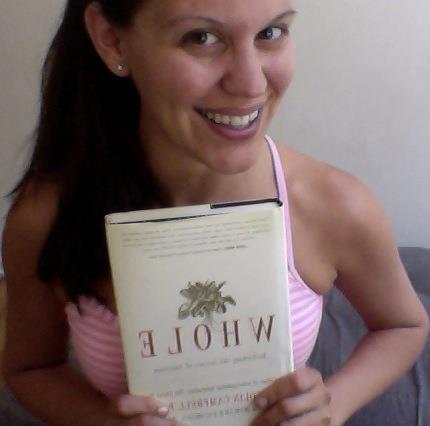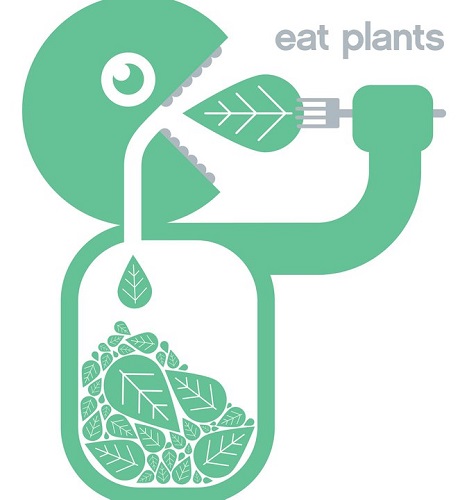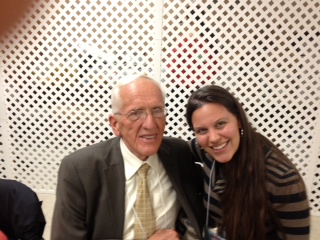Exciting news, Herbies! Dr. T Colin Campbell and Dr. Howard Jacobson's new book, WHOLE,has been released! and it's already aNew York Times Bestseller! I got a chance to read this amazing book a few months ago and I can't recommend it enough. I'm delighted to have the opportunity to share an excerpt of the book with you today AND I'm giving away THREE copies of the book!
(p.s. Fun fact: Dr. Campbell and I have the same publisher!)

So what's the difference between The China Study and WHOLE?
Dr. Campbell: The China Study was basically a summary of the evidence and what I thought it showed. It was based on my own career, of course, but also involving the work of others. Whole, in contrast, is to count why. In other words, the China Study was: Here's the scene, here's the evidence, here's what we think it says. And Whole is sort of an explanation of why this evidence actually works. It really has a dramatic effect on health - even more than I thought when I finished writing The China Study. I mean I was pretty confident in what I was saying, of course, but nonetheless, since that book was published, what we now know about this is just truly dramatic."**
I also was interviewed by co-author Dr. Howard Jacobson about living the plant-based lifestyle, which was a BLAST. And you can listen to the interview! (The link downloads an mp3.) And don't forget to check out The China Study Cookbook, which was recently released as well.

An excerpt from WHOLE:
Making Ourselves Whole
“If a little bird were to take a grain of sand in its beak from the seashore and somehow manage to fly it to the furthest quasar in the universe, and if it returned and repeated the process until all the sand of the oceans both from the beaches and the bottoms were gone, eternity would be just beginning.”—Anonymous, written on the wall of the Maté Factor Cafe, Ithaca Commons, NY
If this book does nothing else, I hope that it convinces you that we need to change the way we think about health. We must recognize nutrition as a cornerstone of our health-care system, not a footnote. We must also recognize the limitations of our reductionist paradigm and learn to accept the validity of evidence beyond what that paradigm allows us to perceive. If we are truly to understand the meaning of nutrition, its effect on the body, and its potential to transform our collective health, we must stop seeing reductionism as the only method by which to achieve progress and start seeing it as a tool, the results of which can only be properly evaluated within a wholistic framework. And we must be willing to embrace wholism beyond the realm of nutrition. The body is a complex system; bodies gathered together in societies are even more complex; and human life, interwoven with all of nature on this planet, is complex beyond our imagining. We cannot afford to ignore this complexity any longer.
I realize that what I’m proposing here is a tectonic shift in the way we think about nutrition, medicine, and health. The process may not be easy. But it is possible. I know, because this shift is one I experienced myself over the course of my career.
My doctoral dissertation, written over fifty years ago, was on the greater biological value of animal-based protein. I believed then, as firmly as any meat-loving cattle baron, that there was no better, more beneficial food than the protein we received from meat and milk. But as you have seen here and in The China Study, my position today is very different. I am now convinced that there is no healthier way to eat than a whole food, plant-based diet, without added fat, salt, or refined carbohydrates.
For me, the source of that shift was evidence—the empirical, peer-reviewed evidence produced over many years by my own research group. It was bolstered in later years by the evidence produced by my colleagues in clinical medicine, who have been independently and convincingly documenting the WFPB diet's [Editorial Note: WFPB= whole foods, plant-based. Dr. Campbell loves his acronyms, just like me :)]ability to reverse serious diseases in ways unmatched by pills and procedures.
But this shift in thinking required more than just evidence. It also required a shift in my understanding of the body, and therefore in the way I understood evidence related to the body’s functions. And this shift is one that I hope this book will help you achieve, as well.
I’ve given much thought to the next steps that individuals who are sufficiently convinced by what I’ve shared, both here and in The China Study, and who want to help create change, might take. The most important step is to change the way you eat. The diet is simple: eat whole, plant-based foods, with little or no added oil, salt, or refined carbohydrates like sugar or white flour. (Though it may take some research, there are cookbooks out there that will fit your needs—more of them now than ever before.) There is nothing more convincing than experiencing the change for oneself. That crucial shift in the way we think about our health will happen, one person at a time. Eventually, policy will begin to change. Industry, deprived of the income produced by ill health and our ignorance, will follow.
It’s time for us to begin a real revolution—one that begins by challenging our individual beliefs and changing our diets, and ends with the transformation of our society as a whole.

**Giveaway now closed! Winners were chosen randomly and notified via email.**
(This is an old picture of Dr. Campbell & I from 2011 at HTLA. I'm lucky to see him once or twice a year when we both speak at various conferences. I also adore (adore!) his wife. Dr. Campbell once told me the work I did was important. I'll never forget that. I also don't think he'll ever know how much his comment meant to me!!)
**If you'd like to read more from the V for Veg interview with Dr. Campbell quoted above, you can read the entire article on philly.com.














